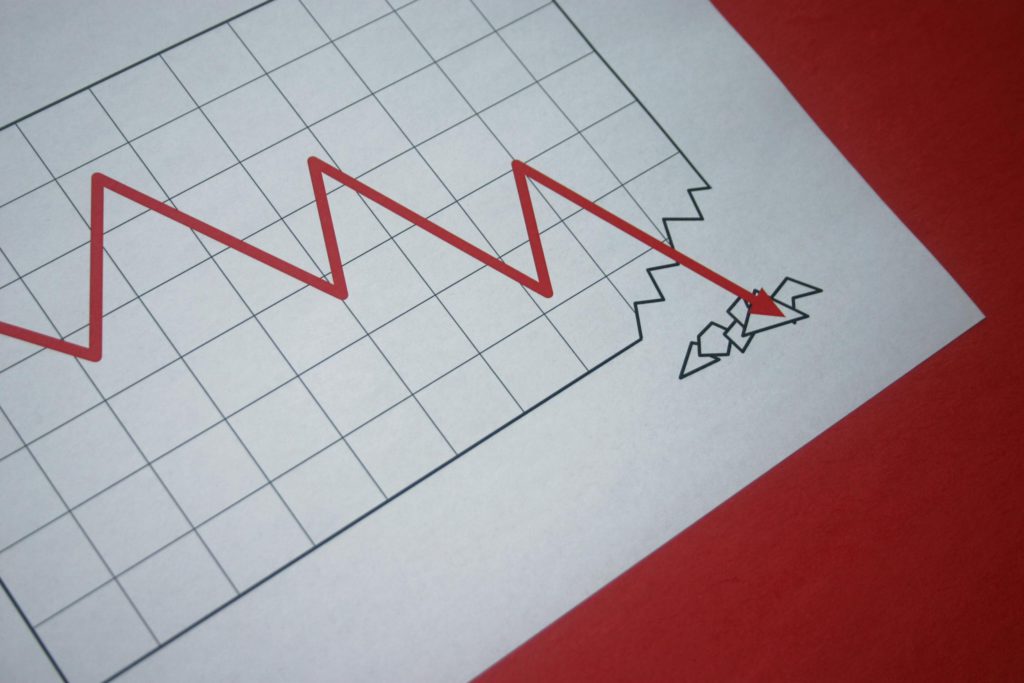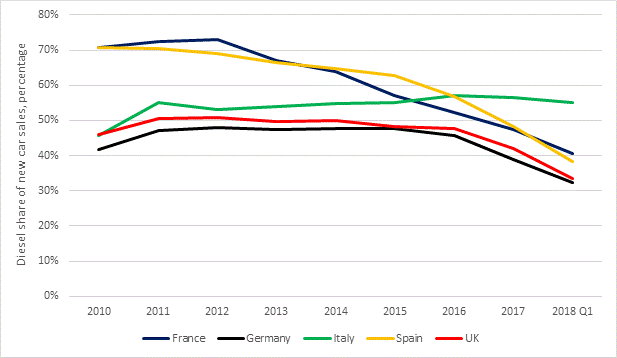Insight: The EU5 diesel share continues to fall but deceleration is anticipated
03 May 2018

3 May 2018
In 2017, petrol cars became the most sold fuel type in Western Europe, overtaking diesel for the first year since 2009, according to ACEA’s 2017 Economic and Market Report. ACEA’s latest data shows that diesel’s market share in the EU15 markets fell by some five percentage points, from 49.9% in 2016 to 44.8% in 2017. Data for the first quarter of 2018 is now available for the Big 5 European markets and reveal that the diesel share continues to fall even further, but a deceleration in the demise of diesel is anticipated.
The drop in diesel sales across Europe in 2017 was predominantly offset by an increase in petrol car sales. Petrol now accounts for about half of new passenger car sales in the EU15, up to 49.4% in 2017 from 45.8% in 2016. The EU15 markets included in the ACEA data are Austria, Belgium, Denmark, Finland, France, Germany, Greece, Ireland, Italy, Luxembourg, Netherlands, Portugal, Spain, Sweden and the United Kingdom.
Furthermore, data from the respective national industry associations reveal that the diesel share contracted further in the Big 5 European markets in the first quarter of 2018. This ongoing defection from diesel to petrol tallies with Autovista Group expectations for the short term but raises increasing concern given the rise in CO2 emissions across the region.
Diesel share (in %) of new car sales in the Big 5 European markets, 2010 to Q1 2018

Except for Italy, the diesel share in the five major European new car markets is now at least five percentage points lower in the first quarter of 2018 than in full-year 2017. In fact, the diesel share in all four markets dipped below 40% in March.
In France, the diesel share fell below 50% in every month in 2017 and after gaining 41% share in January and February even dipped below 40% in March. The share in the first quarter was 40.6% but is expected to dip below 40% for the full year. The last year in France in which the diesel commanded less than a 40% share was 1996. Petrol captured 53.4% of the new car market in Q1, thereby gaining the majority of the share lost by diesel. Although petrol remains more expensive than diesel at the pump in France, the gap is just €0.08 per litre at the time of writing compared to an average of €0.15 per litre in 2017. The French Government is raising tax on diesel fuel and ultimately aims to bring it to cost parity with petrol. The reduced cost advantage of diesel in 2018 has coincided with the further contraction in the diesel share.
Just under 57% of new vehicles sold in Spain in 2016 were diesels. This represented a significant decline from previous years – diesel represented over 70% of registrations at the start of the decade. The diesel share of new car registrations has been below 50% every month since March 2017, except in September. The share has continued to fall since and diesels commanded only a 38% share in Q1 2018, down ten percentage points compared to the 48% share achieved in 2017. This decline is the highest among the EU5 markets and with no upturn expected in 2018, it will be the first time the diesel share in Spain has fallen below 40% in a year since 1996, as in France.
In Germany, the diesel share of the new car market has consistently fallen every month since June 2017 and has been below 40% every month since August. The diesel share in Q1 2018, at 32%, was seven percentage points lower than achieved in 2017. This ongoing downturn was to be expected after a German court ruled in favour of allowing major cities in the country to ban diesel cars. The fall in the diesel share is most dramatic among private new car buyers, dropping from 33% in 2015 to just 18% in the first two months of 2018. Although diesel still accounts for 60% of fleet sales in Germany, down from 74% in 2015, the diesel share of the whole car market could yet fall below 30% in 2018 for the first time since 1999.
Registrations of diesel cars plummeted 17% in the UK in 2017, with their market share falling to 42% from 48% in 2016. Despite the overall contraction of 5.7%, demand for new petrol cars actually increased by 3% and alternative fuel vehicles (AFV) were up 35%. The diesel share has fallen every month since September 2017, and with sales plummeting by a further 33% year-on-year in the first quarter, only 1 in 3 new cars now being registered in the UK is a diesel. Petrol continues to be the predominant beneficiary, having gained a staggering 95% of the market share lost by diesel in the first three months of 2018. Given the confirmed rise in CO2 emissions in the UK already in 2017, this is of acute concern for policymakers seeking to reduce air pollution. Nevertheless, the UK Government increased the vehicle excise duty (VED) rate for the first year of registration on new diesel cars from April 2018. The impact is expected to be minimal though, and a repeat of the pull-forward effect on diesel demand that occurred in early 2017 is not expected.
Italy was bucking the trend, and the diesel share even increased slightly in the first two months of 2018 compared to 2017. But following recent news that Rome is considering a diesel ban and a widening public discussion on the subject, the diesel share of Italy’s new car market fell to 54.3% in March, down one percentage point compared to the share attained in the first two months of the year. Moreover, at 55.1%, the diesel share in Q1 was lower than in Q1 2017 – despite the growth in the first two months.
The ongoing decline in diesel demand across Europe is in line with the consensus view of Autovista Group that the diesel share of the new car market will continue to fall in the short term. Our latest residual value outlook also forecasts that EU5 diesel values will underperform petrol values in 2018 and 2019. We do, however, envisage a deceleration in the demise of diesel in 2018 and 2019 and a ′stabilising effect’ in the medium term, i.e. 2020-25, especially as diesel remains the optimal fuel choice for fleets. Given the rising CO2 levels and the challenge of meeting new emissions targets, diesel could even fight back – especially if policymakers recognise how clean the latest diesel offerings actually are and turn their attention back to petrol cars.